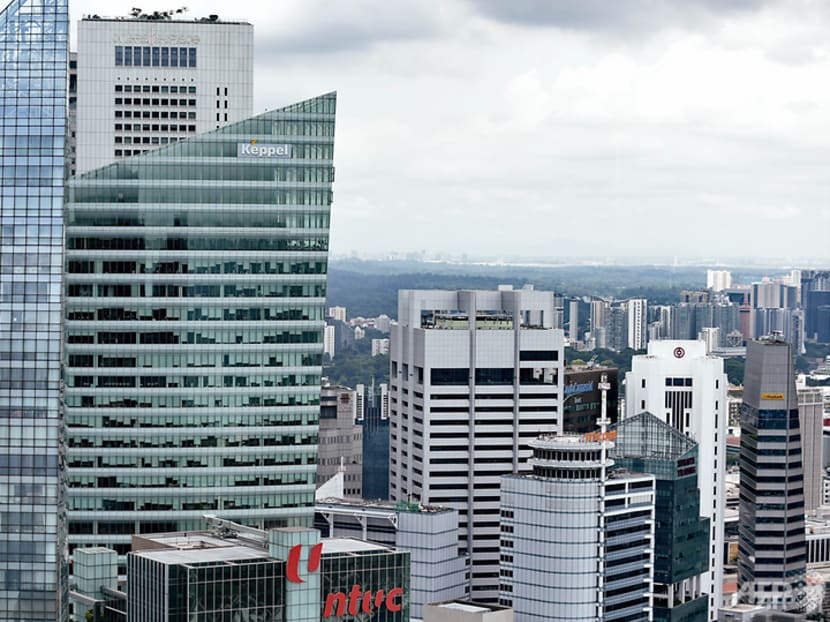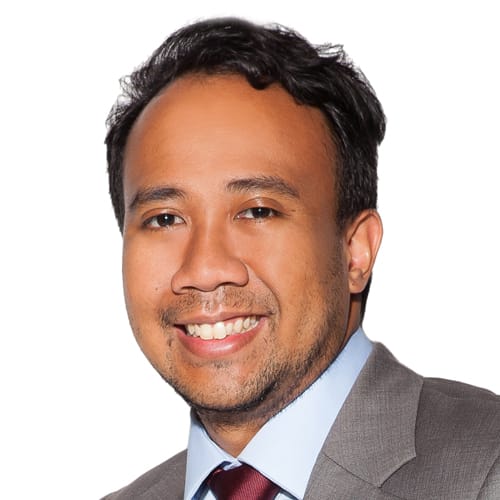Budget 2022: Minimum qualifying salary for new EP, S Pass applicants to go up by S$500 from September

A view of high-rise buildings in Singapore's financial district. (Photo: AFP/Roslan Rahman)
SINGAPORE: The minimum qualifying salaries for new Employment Pass (EP) and S Pass applicants will rise by S$500 from September, Finance Minister Lawrence Wong said in his Budget speech on Friday (Feb 18).
The proportion of work permit holders in the construction and process sectors will also be reduced from 2024.
The minimum qualifying salary for new EP applicants will go up to S$5,000 from the current S$4,500. In the financial services sector, where the salaries are higher, this amount will go up to S$5,500 from the current S$5,000.
The qualifying salaries for older EP applicants, which increase progressively with age, will also be raised in tandem, he said.
For renewal applications, these changes will apply from September next year to give businesses sufficient time to adjust, Mr Wong said.
The minimum qualifying salary for new S Pass applicants will go up to S$3,000 from the current S$2,500. In the financial services sector, a higher minimum qualifying salary of S$3,500 will be introduced.
Thereafter, the minimum qualifying salary for new S Pass applicants will be raised in September next year, and again in September 2025, Mr Wong said.
The specific salary values will be announced closer to the implementation dates based on prevailing local wages them, he said.
The qualifying salaries for older S Pass holders will also be raised in tandem.
Similar to EP, the changes for S Pass renewal applications will apply from September next year to give businesses time to adjust.
To better manage the flow of S Pass holders, Mr Wong said the Tier 1 monthly levy will also be progressively raised from the current S$330 to S$650 by 2025.
This will affect employers whose S Pass holders account for up to 10 per cent of their total workforce. Those with a higher proportion of S Pass holders are already paying a monthly levy of S$650.
The minimum qualifying salary increases will help ensure Singapore brings in foreign workers who are of the right quality, Mr Wong said, and comes after similar raises in 2020.
EMPLOYMENT PASSES
Mr Wong said the Government will aim to ensure that incoming EP holders are comparable in quality to the top one-third of the local professional, managerial, executive and technical (PMET) workforce.
Beyond the qualifying salary, Mr Wong said the Government will refine how EP applications are assessed to improve the “complementarity and diversity” of Singapore’s foreign workforce, and to increase “certainty and transparency” for businesses.
“EP holders should be professionals and senior executives who can contribute to our economy, sharpen the skills of those they work with, and strengthen our workforce,” he said.
“To ensure that EP holders are of the right calibre, we adjust the minimum qualifying salary from time to time, because how much the employer is prepared to pay is a practical indicator of the quality of the EP holder.”
S PASSES
Likewise for S Passes, Mr Wong said the minimum qualifying salary helps ensure those coming in are “of the right quality”.
The Government will aim to ensure that S Pass holders are comparable in quality to the top one-third of local associate professionals and technicians, he said.
WORK PERMITS
Moving on to work permits, Mr Wong said the dependency ratio ceiling – the proportion of work permit holders a firm can employ – in the construction and process sectors will be reduced from the current 1:7 to 1:5 from Jan 1, 2024.
This means that the proportion of work permit holders in these sectors will be reduced from 87.5 per cent to 83.3 per cent.
“The current Man-Year Entitlement (MYE) framework will be replaced with a new levy framework that will encourage firms to support more offsite work and employ more higher-skilled work permit holders,” he said.
The MYE framework refers to the number of work permit holders a main contractor is entitled to employ based on the value of projects or contracts awarded by developers or owners. It is allocated based on the number of “man-years” required to complete a project.
Mr Wong said these moves will further improve productivity and support manpower-efficient solutions, as well as transform sectors that have been more heavily dependent on foreigners.
SINGAPORE WILL “CONTINUE TO STAY OPEN”
Overall, Mr Wong said the foreign worker policy adjustments will apply mainly to the broad middle of the workforce.
“This is where we have Singaporeans doing the jobs, but we need to continually adjust our rules to ensure better complementarity between our foreign and local workforce,” he said.
At the higher end of the workforce where there are “acute” skill shortages, Singapore will continue to bring in professionals with the right abilities, he added.
Mr Wong stressed that Singapore will continue to stay open and welcome talent from around the world.
“By combining local and foreign professionals, we form the best teams in Singapore to create value together,” he said.
“This gives us that extra advantage to excel amidst intense global competition, and to create many more good jobs and career choices for Singaporeans.”






